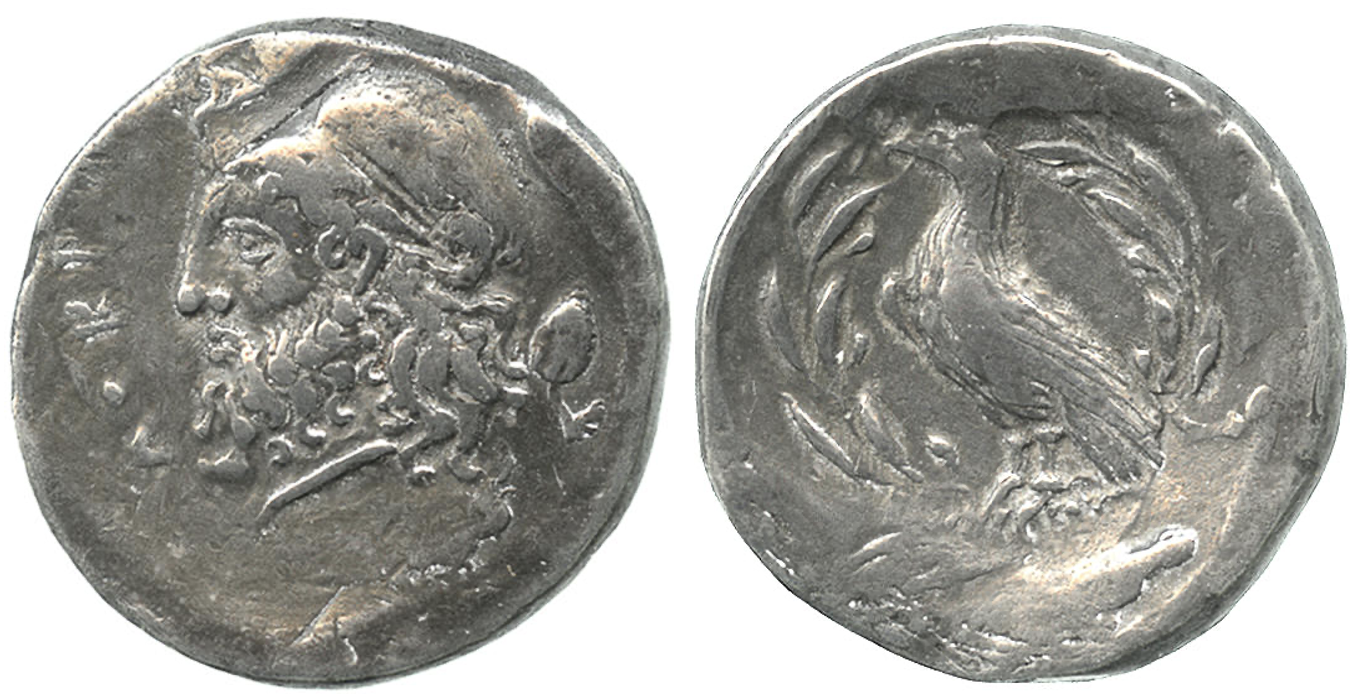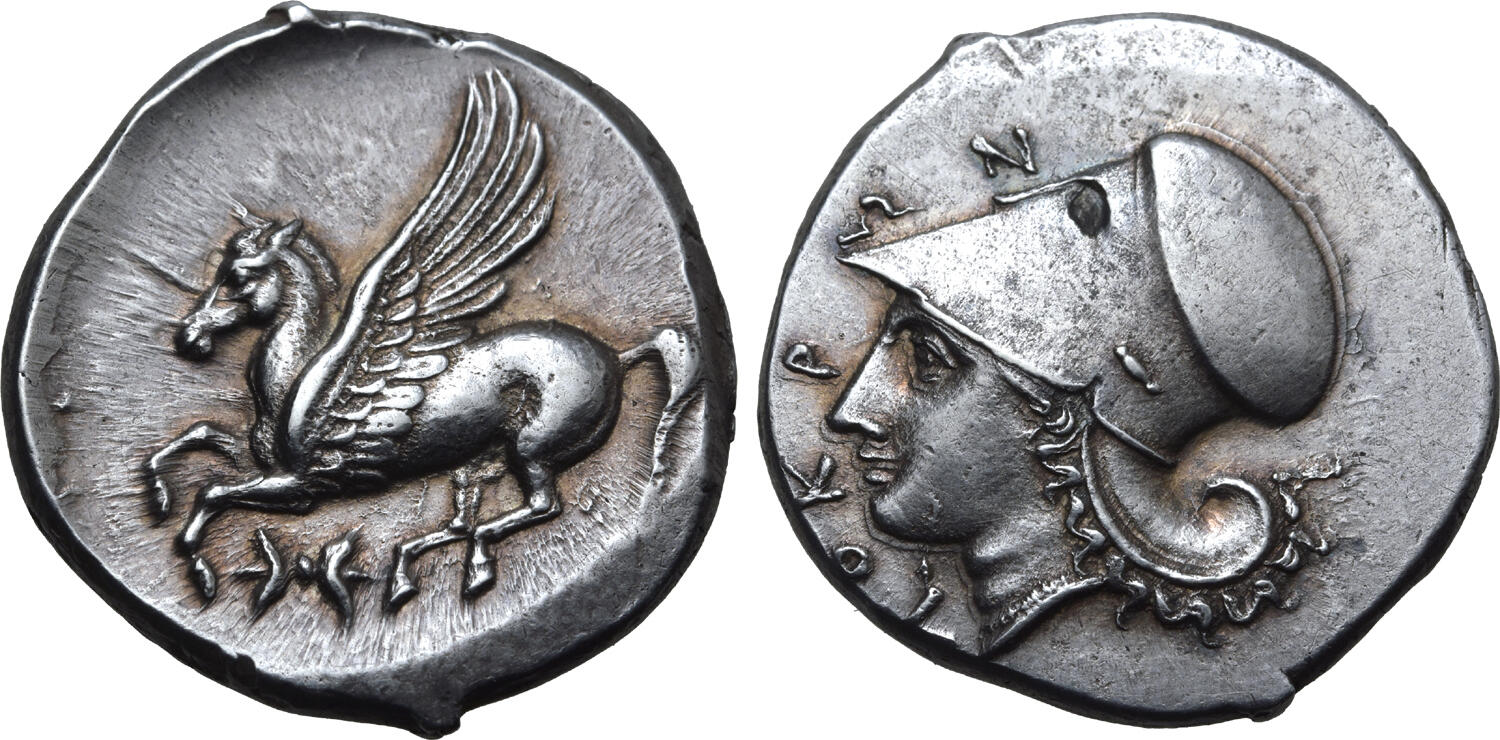1908 - Locri Epizephyrii (nomos Zeus/eagle) over Corinthian type (Cambridge, FM, MacClean, n° 1799)
From SILVER
(CSV import-Overstrikes-2022-08-16) |
|||
| Line 1: | Line 1: | ||
{{Overstrike | {{Overstrike | ||
| + | |Image overstriking coin=SO 1192 - Locri Epizephyrii over Corinth.png | ||
| + | |Image reference overstriking coin=https://data.fitzmuseum.cam.ac.uk/id/object/192629 | ||
| + | |Image overstruck variety=Corinth 350 BCE left.jpeg | ||
| + | |Image reference overstruck variety=https://pro.coinarchives.com/a/lotviewer.php?LotID=2227403&AucID=5405&Lot=114 | ||
|Museum collection=Cambridge, Fitzwilliam Museum, CM.MC.1799-R | |Museum collection=Cambridge, Fitzwilliam Museum, CM.MC.1799-R | ||
|Private collection=McClean collection | |Private collection=McClean collection | ||
|Obverse legend=ΛΟΚΡΩΝ | |Obverse legend=ΛΟΚΡΩΝ | ||
| + | |Obverse legend language=Greek | ||
|Obverse description=Head of Zeus left, wearing laurel wreath. To right, pinecone. | |Obverse description=Head of Zeus left, wearing laurel wreath. To right, pinecone. | ||
|Reverse description=Eagle left within wreath. | |Reverse description=Eagle left within wreath. | ||
|Mint=Locri Epizephyrii | |Mint=Locri Epizephyrii | ||
|Ancient region=Magna Graecia (Bruttium) | |Ancient region=Magna Graecia (Bruttium) | ||
| − | |Date from= | + | |Date from=400 BCE |
| − | |Date to= | + | |Date to=300 BCE |
| + | |Period=Classical | ||
| + | |Metal=Silver | ||
|Weight=7.65 | |Weight=7.65 | ||
|Denomination=stater / didrachm | |Denomination=stater / didrachm | ||
|Standard=Achaian | |Standard=Achaian | ||
| − | |Coin reference= | + | |Coin reference=Grose 1916, p. 201-245, pl. vii, n° 10 ; Noe 1957, p. 13-42, pl. V-XIV (group VIII, p. 35, pl. XII, h) ; Grose 1979, p. 213, n° 1799 and pl. 57, n° 9. |
| − | |Coin series reference= | + | |Coin series reference=HN Italy, n° 2312. ; HGC 1, n° 1564 |
| + | |Coin series web reference=https://greekcoinage.org/iris/id/locri_epizephyrii.hn_italy.2312 | ||
|Overstruck obverse description=Pegasus | |Overstruck obverse description=Pegasus | ||
|Overstruck reverse description=Head of Athena. | |Overstruck reverse description=Head of Athena. | ||
Revision as of 16:59, 16 June 2023
400 BCE - 300 BCEΛΟΚΡΩΝ
Location/history
| Museum collectionMuseum collection: | Cambridge, Fitzwilliam Museum, CM.MC.1799-R | |
| Private collection(s)Private collection(s) ᵖ: | McClean collection |
Overstriking coin
Description
| ObverseInscription or printing placed on the obverse.: | ΛΟΚΡΩΝ (Greek) Head of Zeus left, wearing laurel wreath. To right, pinecone. | ReverseInscription or printing placed on the reverse.: | Eagle left within wreath. |
Mint and issuing power
| MintIdentifies the place of manufacture or issue of a numismatic object.: | Locri Epizephyrii | Ancient regionAncient region. | Magna Graecia (Bruttium) | Modern countryModern country: Italy | AuthorityIdentifies the issuing power. The authority can be "pretended" when the name or the portrait of X is on the coin but he/she was not the issuing power. It can also be "uncertain" when there is no mention of X on the coin but he/she was the issuing power according to the historical sources: |
Chronology
| FromIdentifies the initial date in a range assigned in a numismatic context. 400 BCE toIdentifies the final date in a range assigned in a numismatic context.. 300 BCE | Classical 480-323 BC |
Physical description
| MetalThe physical material (usually metal) from which an object is made.: Silver |
WeightWeight of the numismatic object (in grams). in grams: 7.657.65 g <br />7,650 mg <br /> | DenominationTerm indicating the value of a numismatic object. Examples: tetradrachm, chalkous, denarius.: stater / didrachm | |
| StandardStandard.: Achaian | |||
References
| Coin referenceReference of the Coin: | Grose 1916, p. 201-245, pl. vii, n° 10, Noe 1957, p. 13-42, pl. V-XIV (group VIII, p. 35, pl. XII, h), Grose 1979, p. 213, n° 1799 and pl. 57, n° 9. | Coin series referenceReference to coin series study: | HN Italy1HN Italy, n° 2312., HGC 12HGC 1, n° 1564 |
| Coin series web referenceCoin series web references: | |||
Overstruck type
Description
| ObverseInscription or printing placed on the obverse.: | Pegasus | ReverseInscription or printing placed on the reverse.: | Head of Athena. |
Mint and issuing power
| MintIdentifies the place of manufacture or issue of a numismatic object. ᵖ: | Corinth | Ancient regionAncient region. ᵖ | Peloponnesus | Modern countryModern country: Greece | AuthorityIdentifies the authority in whose name (explicitly or implicitly) a numismatic object was issued. ᵖ: |
Chronology
| FromIdentifies the initial date in a range assigned in a numismatic context. toIdentifies the final date in a range assigned in a numismatic context.. | periodTime period of the numismatic object. |
Physical description
References
| Coin type referenceReference to coin series study ᵖ: |
Additional data
| Frequency of overstrikesFrequency of overstrikes: | Level of confidenceLevel of confidence of the identification: | ||
| RemarksRemarks: | |||

